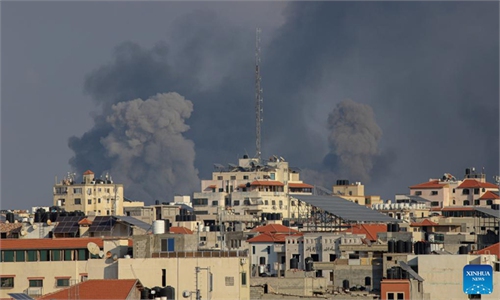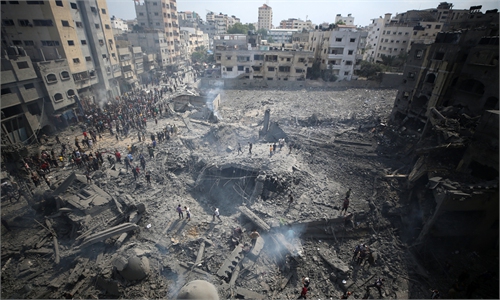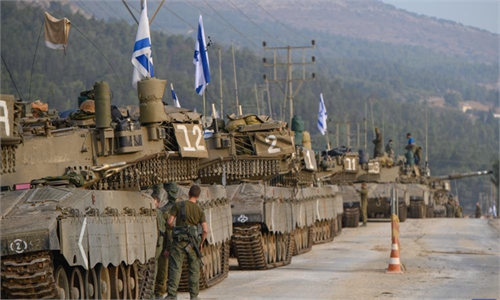Birds fly as smoke billows following an Israeli airstrike in the southern Gaza Strip city of Rafah, on Oct. 10, 2023. Photo:Xinhua
#Opinion: When will Israel launch a ground attack on Gaza? How will the next battle be fought? Fundamentally, Israel aims to fight a brutal military encirclement, while Hamas seeks to wage a political war, attempting to leverage their sacrifices and those of the Palestinian population in Gaza to galvanize international pressure against Israel, writes
globaltimes.cn/page/202310/12
Benjamin Netanyahu, the Prime Minister of Israel, stated firmly on Wednesday that every Hamas member is "a dead man." And the Israeli military is intensifying its ground preparations while conducting airstrikes. Over 300,000 newly recruited Israeli reserve troops have gathered at the Gaza border. The exact number of Hamas military personnel is unknown, but it was estimated to be around 30,000 in 2021.
Gaza is a narrow strip of land, approximately 40 kilometers long from north to south, with a width ranging from six to 10 kilometers. It is bordered by Israeli-controlled areas and the Mediterranean Sea, with only the southern part adjacent to Egypt. The population of Gaza is densely concentrated, with approximately 2.3 million people. If hundreds of thousands of Israeli troops enter simultaneously, it will inevitably result in a large number of civilian casualties.
The Israeli military's capabilities have been regarded as "mythical" in the past, while the Hamas forces have been seen as a ragtag group. However, in this surprise attack on Israel, Hamas unexpectedly demonstrated strong organizational and tactical abilities. They miraculously managed to keep their actions a secret, which prevented Israeli and US intelligence agencies from knowing about the large-scale surprise attack Hamas had been preparing.
The Israeli army is currently assembling its ground forces. However, they haven't launched an attack yet. This could be attributed to several reasons. First, the Israeli military might want to continue airstrikes for some time to decrease the difficulty of a land assault. Second, they could be secretly negotiating the release of hostages with Hamas. According to media reports, Hamas is holding at least 150 hostages taken from Israel on Saturday. Third, the Israeli military is intensifying the development of specific attack routes and urban warfare methods. Finally, prior to the battle, they are conducting urban warfare training for newly enlisted reserve men. In addition to these factors, I believe another key element is that Israel has cut off power to Gaza, causing the nights to be pitch black. The Israeli military could be waiting for Gaza's backup power supply to run out, rendering all smartphones in Gaza incapacitated and unable to be charged. When the Israeli military attacks, the spread of violent recordings will be drastically reduced.
The Israeli military has an unrivaled edge. However, eliminating Hamas entirely will not be easy. Despite the fact that the Israeli military has more troops and advanced weapons, Gaza is analogous to the chaotic urban-rural peripheral zones of China's major cities a few years ago. Hamas is familiar with every location, whereas the Israeli military is not. In the 1982 Israeli attack on Lebanon to expel the Palestine Liberation Organization (PLO), the Israeli military's goal was to surround the PLO fighters led by former PLO chairman Yasser Arafat. Eventually, the entire PLO was forced into a small area and agreed to withdraw from Lebanon, so both sides did not engage in a real all-out battle. But this time is different, as the Israeli military explicitly aims to eliminate Hamas, and the entire battle will be a fight to the death.
But how can Hamas be eradicated? Hamas fighters' positions are interwoven with residential areas. If Israel conducts methodical urban warfare against Hamas fighters, it will ultimately result in a close battle. Hamas fighters will be able to murder Israeli soldiers at close range. The Israeli military will sustain massive losses. If they take a different approach and flatten entire neighborhoods, as long as Hamas fighters remain inside, Israeli military losses will be decreased, but that would be no different from a "massacre." Israel is already enraged, but if "massacre" becomes the international public opinion's characterization and accusation, the pressure Israel faces in terms of public opinion will be qualitatively different from today.
When it comes to urban warfare, it's a complex political issue in the context of modern ethical constraints. In Ukraine, when Russian forces targeted cities like Mariupol, they opened humanitarian corridors for civilians to evacuate, leaving only military personnel to engage in combat on the streets. However, in Gaza, the population has nowhere to go, and some of those whose homes have been destroyed seek refuge in schools and refugee facilities run by the UN. Unfortunately most remain confined to their homes. Some politicians are advocating, "crushing and flattening Gaza." If this is what is to come, it would likely trigger a tsunami of international condemnation. Despite the potential disruption of communications of Gaza residents, a humanitarian catastrophe in the area is unlikely to remain hidden.
Hamas' tactics will be tied to Israel's dilemma. On the surface, by launching this attack against Israel at the cost of pushing themselves into a corner, Hamas seem prepared for the worst but hopeful of an escape route in this dire situation. If Israel were to "flatten" the city, Hamas anticipates an eruption of international public opinion in their favor, providing a protective shield. They do not genuinely believe they would be entirely eradicated from the Gaza region.
If a full-scale urban battle ensues, substantial casualties among Gaza's population will be predictable. I recently saw a Chinese scholar with extensive knowledge of Israeli and Palestinian affairs comment in a WeChat group, saying that he would not be surprised if the Palestinian death toll in Gaza reaches 100,000.
The exact timing and nature of any ground offensive are yet to be seen. However, fundamentally, Israel aims to fight a brutal military encirclement, while Hamas seeks to wage a political war, attempting to leverage their sacrifices and those of the Palestinian population in Gaza to galvanize international pressure against Israel. Israel's military advancement and the targeting of more Hamas members and ordinary Palestinians do not necessarily lead to victory but could reach a critical point where it triggers a significant shift in the public opinion and political situation landscape. Israel must resist such a turn, and Hamas is determined to hold out until that moment. This is the real battleground in the Gaza ground conflict.
Furthermore, it's worth noting that due to changing demographics in the US, support for Israel is not as monolithic as it used to be. The only Palestinian-American representative, Rashida Tlaib, has publicly called for an end to US support for Israel and expressed condolences for "the Palestinian and Israeli lives lost yesterday, today and every day." While President Joe Biden has publicly supported Israel's right to self-defense, there have been reports that he advised Netanyahu that democracies are more secure when act according to "the rule of law." Additionally, Secretary of State Antony Blinken on Sunday tweeted that he "encouraged Turkey's advocacy for a cease-fire," which he later quietly deleted after receiving criticism from the Republican Party. Earlier, the US Office of Palestinian Affairs had tweeted shortly after the outbreak of the conflict, urging all sides to refrain from violence and retaliatory attacks, emphasizing that "terror and violence solve nothing."
As the conflict intensifies, the evolving international public opinion landscape deserves attention. The speed and intensity with which this new dynamic forms will determine whether Israel can truly "flatten" Gaza or if its campaign against Hamas becomes a new "unfinished project."
The author is a Chinese media professional. opinion@globaltimes.com.cn
Chinese public possesses very extensive calm and rationality over Israeli-Palestinian conflict
Benjamin Netanyahu, the Prime Minister of Israel, stated firmly on Wednesday that every Hamas member is "a dead man." And the Israeli military is intensifying its ground preparations while conducting airstrikes. Over 300,000 newly recruited Israeli reserve troops have gathered at the Gaza border. The exact number of Hamas military personnel is unknown, but it was estimated to be around 30,000 in 2021.
Gaza is a narrow strip of land, approximately 40 kilometers long from north to south, with a width ranging from six to 10 kilometers. It is bordered by Israeli-controlled areas and the Mediterranean Sea, with only the southern part adjacent to Egypt. The population of Gaza is densely concentrated, with approximately 2.3 million people. If hundreds of thousands of Israeli troops enter simultaneously, it will inevitably result in a large number of civilian casualties.
The Israeli military's capabilities have been regarded as "mythical" in the past, while the Hamas forces have been seen as a ragtag group. However, in this surprise attack on Israel, Hamas unexpectedly demonstrated strong organizational and tactical abilities. They miraculously managed to keep their actions a secret, which prevented Israeli and US intelligence agencies from knowing about the large-scale surprise attack Hamas had been preparing.
The Israeli army is currently assembling its ground forces. However, they haven't launched an attack yet. This could be attributed to several reasons. First, the Israeli military might want to continue airstrikes for some time to decrease the difficulty of a land assault. Second, they could be secretly negotiating the release of hostages with Hamas. According to media reports, Hamas is holding at least 150 hostages taken from Israel on Saturday. Third, the Israeli military is intensifying the development of specific attack routes and urban warfare methods. Finally, prior to the battle, they are conducting urban warfare training for newly enlisted reserve men. In addition to these factors, I believe another key element is that Israel has cut off power to Gaza, causing the nights to be pitch black. The Israeli military could be waiting for Gaza's backup power supply to run out, rendering all smartphones in Gaza incapacitated and unable to be charged. When the Israeli military attacks, the spread of violent recordings will be drastically reduced.
The Israeli military has an unrivaled edge. However, eliminating Hamas entirely will not be easy. Despite the fact that the Israeli military has more troops and advanced weapons, Gaza is analogous to the chaotic urban-rural peripheral zones of China's major cities a few years ago. Hamas is familiar with every location, whereas the Israeli military is not. In the 1982 Israeli attack on Lebanon to expel the Palestine Liberation Organization (PLO), the Israeli military's goal was to surround the PLO fighters led by former PLO chairman Yasser Arafat. Eventually, the entire PLO was forced into a small area and agreed to withdraw from Lebanon, so both sides did not engage in a real all-out battle. But this time is different, as the Israeli military explicitly aims to eliminate Hamas, and the entire battle will be a fight to the death.
But how can Hamas be eradicated? Hamas fighters' positions are interwoven with residential areas. If Israel conducts methodical urban warfare against Hamas fighters, it will ultimately result in a close battle. Hamas fighters will be able to murder Israeli soldiers at close range. The Israeli military will sustain massive losses. If they take a different approach and flatten entire neighborhoods, as long as Hamas fighters remain inside, Israeli military losses will be decreased, but that would be no different from a "massacre." Israel is already enraged, but if "massacre" becomes the international public opinion's characterization and accusation, the pressure Israel faces in terms of public opinion will be qualitatively different from today.
When it comes to urban warfare, it's a complex political issue in the context of modern ethical constraints. In Ukraine, when Russian forces targeted cities like Mariupol, they opened humanitarian corridors for civilians to evacuate, leaving only military personnel to engage in combat on the streets. However, in Gaza, the population has nowhere to go, and some of those whose homes have been destroyed seek refuge in schools and refugee facilities run by the UN. Unfortunately most remain confined to their homes. Some politicians are advocating, "crushing and flattening Gaza." If this is what is to come, it would likely trigger a tsunami of international condemnation. Despite the potential disruption of communications of Gaza residents, a humanitarian catastrophe in the area is unlikely to remain hidden.
Hamas' tactics will be tied to Israel's dilemma. On the surface, by launching this attack against Israel at the cost of pushing themselves into a corner, Hamas seem prepared for the worst but hopeful of an escape route in this dire situation. If Israel were to "flatten" the city, Hamas anticipates an eruption of international public opinion in their favor, providing a protective shield. They do not genuinely believe they would be entirely eradicated from the Gaza region.
If a full-scale urban battle ensues, substantial casualties among Gaza's population will be predictable. I recently saw a Chinese scholar with extensive knowledge of Israeli and Palestinian affairs comment in a WeChat group, saying that he would not be surprised if the Palestinian death toll in Gaza reaches 100,000.
The exact timing and nature of any ground offensive are yet to be seen. However, fundamentally, Israel aims to fight a brutal military encirclement, while Hamas seeks to wage a political war, attempting to leverage their sacrifices and those of the Palestinian population in Gaza to galvanize international pressure against Israel. Israel's military advancement and the targeting of more Hamas members and ordinary Palestinians do not necessarily lead to victory but could reach a critical point where it triggers a significant shift in the public opinion and political situation landscape. Israel must resist such a turn, and Hamas is determined to hold out until that moment. This is the real battleground in the Gaza ground conflict.
Furthermore, it's worth noting that due to changing demographics in the US, support for Israel is not as monolithic as it used to be. The only Palestinian-American representative, Rashida Tlaib, has publicly called for an end to US support for Israel and expressed condolences for "the Palestinian and Israeli lives lost yesterday, today and every day." While President Joe Biden has publicly supported Israel's right to self-defense, there have been reports that he advised Netanyahu that democracies are more secure when act according to "the rule of law." Additionally, Secretary of State Antony Blinken on Sunday tweeted that he "encouraged Turkey's advocacy for a cease-fire," which he later quietly deleted after receiving criticism from the Republican Party. Earlier, the US Office of Palestinian Affairs had tweeted shortly after the outbreak of the conflict, urging all sides to refrain from violence and retaliatory attacks, emphasizing that "terror and violence solve nothing."
As the conflict intensifies, the evolving international public opinion landscape deserves attention. The speed and intensity with which this new dynamic forms will determine whether Israel can truly "flatten" Gaza or if its campaign against Hamas becomes a new "unfinished project."
The author is a Chinese media professional. opinion@globaltimes.com.cn
RELATED ARTICLES
Humanitarian crisis looms as Israel poised for ground operation
As the casualties keep climbing in the Gaza Strip, Chinese observers warned a humanitarian crisis in the region is unavoidable if the fighting between Hamas and Israel doesn't stop. The observers also said such a crisis, if caused by atrocities, could trigger a public opinion explosion and reverse the political situation at certain tipping point. At this juncture, the US, which can exert real influence on Israel, is urged to pressure Israel to cool down its offensive in Gaza, instead of further stoking tension in the Middle East.





No comments:
Post a Comment